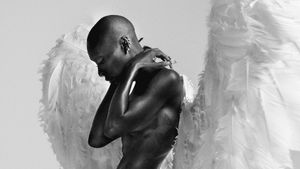I first heard the word while watching YouTube.
During a video, someone used the term transgender as a derogatory joke. I'm not ashamed to admit that the idea was off-putting to me. I couldn't imagine why someone would want to alter themselves because they didn't "fit in."
It wasn't until years later that I realized I was trans.
It was my preconceived ideas that held me back from discovering this. Even as someone who knew they were queer from a young age, it was easy to believe that being trans was a mental illness. It's one of the reasons that I suppressed my identity for so long.
I never thought I reached the acceptable amount of suffering to identify as a trans person. These experiences taught me that modern-day society defines the trans experience through a standard of shared suffering that prevents trans youth from telling their stories.
Negative assumptions about trans people are embedded in our society. Our identities are medicalized through the label of gender dysphoria, as described by the American Psychiatric Association. Many medical institutions require this diagnosis to access gender-affirming care. Because of this, I believed all trans people had intense gender dysphoria to be taken seriously.
I didn't consider myself trans since my dysmorphia was never painfully evident.
I wasn't telling my mom at a young age that I should have been born a boy.I was never distressed by the development of my body during puberty. I was okay doing "girly" things and didn't have an adverse reaction every time someone referred to me using she/her pronouns. I could live a happy life without bottom surgery because the thought of going without it has never been a source of distress for me.
Nevertheless, expressing myself as the gender I identify as is euphoric, and I'm still just as transgender as any other transgender individual.
I've come to realize that gender dysmorphia, at least how it is viewed, puts an imaginary barrier between cis and trans people and imposes a psychological label on an everyday experience.
When a cisgender man is insecure about his masculinity, it's a normal part of life; if I'm insecure about my masculinity, it's seen as a mental illness. Suppose a cisgender woman is insecure about her chest being too small. In that case, she has a common insecurity. But if a trans woman does, then they're seen as ungrateful for their body.
The only difference is sex assigned at birth, yet society makes this difference seem more significant.
Trans people are forced to focus on our suffering because it comforts cis people, even if it harms us. If there is this barrier between cis and trans people, then our society doesn't have to change their view of gender. They can create an "us" and "them" mentality and see themselves as
fundamentally "different" than trans people.
I hope more people can detach the idea of the trans experience from the concept of internal struggle. Why? Because we are more than our struggles.
I'm a trans teen, not a mental illness.
Scar Rulien is equalpride’s inaugural Valedictorian for the Class of 2024 and a Student Advocate for GLSEN, the nation’s leading organization working to end discrimination, harassment, and bullying based on sexual and gender identities. Learn more about GLSEN at glsen.org.
Voices is dedicated to featuring a wide range of inspiring personal stories and impactful opinions from the LGBTQ+ and Allied community. Visit pride.com/submit to learn more about submission guidelines. We welcome your thoughts and feedback on any of our stories. Email us at voices@equalpride.com. Views expressed in Voices stories are those of the guest writers, columnists and editors, and do not directly represent the views of PRIDE.com or our parent company, equalpride.






























































































































